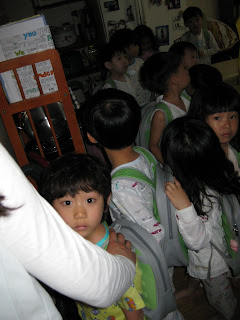
As I said before, Koreans are serious about cleanliness. So serious that whenever the kindergarten class of New York Academy of English has a field trip (to the mountains, on a hike, to the river) all children must be cleaned and properly scrubbed before returning to their respective homes. I guess the thought of sending students dirty is unacceptable. Since my temporary host's home was closest to the school, her apartment was the volunteered location were such and event could take place. When I arrived at the apartment that afternoon there were twenty five tiny pairs of shoes lined up in 4 little rows by the door. And like an assembly line in a Dr. Seuss book, 25 dirty children filed into the bathroom and emerged as 25 sparkly clean children. They were quickly rounded up re-shoed and returned to school for a clean bus ride home to Mom and Dad. The most amazing part was the state of the bathroom- it was a complete un- disaster. As if there were no little children pitter-patting through our bathroom at all- not even a wet towel. Astonishing.